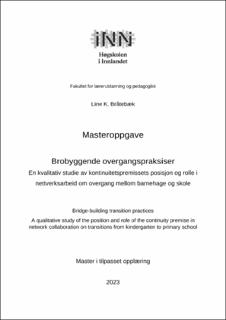| dc.contributor.advisor | | |
| dc.contributor.author | Bråtebæk Line Kristin | |
| dc.date.accessioned | 2023-06-26T16:10:21Z | |
| dc.date.available | 2023-06-26T16:10:21Z | |
| dc.date.issued | 2023 | |
| dc.identifier | no.inn:inspera:147999575:97635051 | |
| dc.identifier.uri | https://hdl.handle.net/11250/3073279 | |
| dc.description.abstract | Denne masteroppgaven i tilpasset opplæring er en kvalitativ studie som utforsker hvordan kontinuitet ivaretas når barnehager og skoler samarbeider om overganger. Tematikken er undersøkt med utgangspunkt i følgende problemstilling: Hvordan ivaretas kontinuitet som et premiss for en god overgang gjennom samarbeid i nettverk for barnehage, skole og kommunale veiledere? Formålet med oppgaven er å frembringe kunnskap om kontinuitetspremissets posisjon og rolle i nettverksarbeid om overgang mellom skole og barnehage.
Metodisk baserer undersøkelsene seg på observasjoner av nettverkssamlinger og møter, samt kvalitative intervjuer av seks deltakere fra barnehage, skole og den kommunale veiledningstjenesten. Teoretisk forankres oppgaven i John Deweys teori om kontinuitet i erfaring, ulike former for kontinuitet beskrevet av Broström og Hogsnes, og i teori om organisasjonslæring. Analysen ble gjennomført i to steg. Først ved å kategorisere sentrale temaer som gjorde seg gjeldene i datamaterialet, og deretter ved å sammenligne kategoriene med relevant teori.
De viktigste funnene i dette prosjektet er at kontinuitet, slik det presenteres i litteraturen, i stor grad synes å være ivaretatt i nettverket som helhet. Når det gjelder teoripresentasjonen på nettverkssamlingene, indikerer funnene at presentasjonen ikke gir en tilstrekkelig og dyp forståelse av begrepet kontinuitet og betydningen det har for barns overgang fra barnehage til skole. Kontinuitet blir derimot ivaretatt gjennom diskusjoner og aktiviteter i nettverket. Undersøkelsene antyder at filosofisk kontinuitet, spesielt i form av lek som pedagogisk tilnærming, blir særlig vektlagt i nettverkssamlingene. Diskusjonene omhandler hvordan barnehagen og skolen orienterer seg mot hverandre med tanke på å skape kontinuitet i innhold og arbeidsmåter gjennom en lekende tilnærming til læring.
Diskusjoner i nettverket inkluderer også hvordan utformingen av det fysiske miljøet i barnehage og skole kan bidra til fysisk kontinuitet for barna i overgangen. Fysisk kontinuitet løftes også gjennom diskusjon om overgangsobjekter og besøk til hverandres virksomheter. Funn viser at sosial kontinuitet i form av sosiale relasjoner mellom barna ikke ble vektlagt i nettverket, men ivaretas gjennom andre fora i undersøkelseskommunen. Studien viser også at kommunikasjonsmessig kontinuitet ivaretas gjennom nettverkets organisering og aktiviteter. Funn peker på at deltakerne opplever å bli kjent med hverandres verdigrunnlag og praksis, i tillegg til at nettverket har en relasjonsbyggende funksjon. Dette vises også å være et sentralt grunnlag for ivaretakelse av de andre formene for kontinuitet i nettverket. | |
| dc.description.abstract | This master thesis in adapted education is a qualitative study that explores how continuity is maintained when kindergartens and schools collaborate on transitions. The research question is: «How is continuity maintained as a premise for a successful transition to school, through collaboration in a network for kindergarten, school and municipal advisors?» The purpose of the thesis is to generate knowledge about the position and role of the continuity premise in network collaboration for kindergartens and schools.
Observations of networks meetings, and interviews with six participants from kindergarten, school and the municipal advisory service form the methodological basis for the study. The thesis is theoretically anchored in John Deweys theory of continuity in experience, various forms of continuity described by Broström and Hogsnes, and in organizational learning theory. The analysis was mainly carried out in two steps. First, inductively by categorizing central themes that emerged from the data material. Then the categories were compared to relevant theory outlined above.
The key findings in this project are that continuity as a premise for a succesful tranition to school appairs to be mostly upheld through the network. However, the study shows that continuity is not well enought maintained in the theory presentation at network meetings. The findings indicate that the presentation does not provide a sufficent and deep understanding of the concepts and the meaning of continuity, for childrens transition from kindergarten to school. On the other hand, the study suggests that continuity, to a large extent, is maintained through discussions and activities in the network. Particularly in the form of philosophical continuity, with focus on how the institutions orient themselves towards each other, and creating continuity in content and methods through a playful approch to learning. The study also indicates discussions on how design of rooms and materials can contribute to increase physical continuity for children during the transition. Physical continuity is also raised through perspectives on transition objects and visits to each others institutions. The study found that social continuity in the form of social relationships between children, was not emphasized to the same extent in the network, but is maintained through other forums in the investegated municipality. Communicative continuity was maintained through the network’s organization and activities. The participants experience getting to know each other’s values and practices, and that the network’s relationship-building function, is sentral for maintaining the other forms of continuity. | |
| dc.language | nob | |
| dc.publisher | Inland Norway University | |
| dc.title | Brobyggende overgangspraksiser: En kvalitativ studie av kontinuitetspremissets posisjon og rolle i nettverksarbeid om overgang mellom barnehage og skole | |
| dc.type | Master thesis | |
